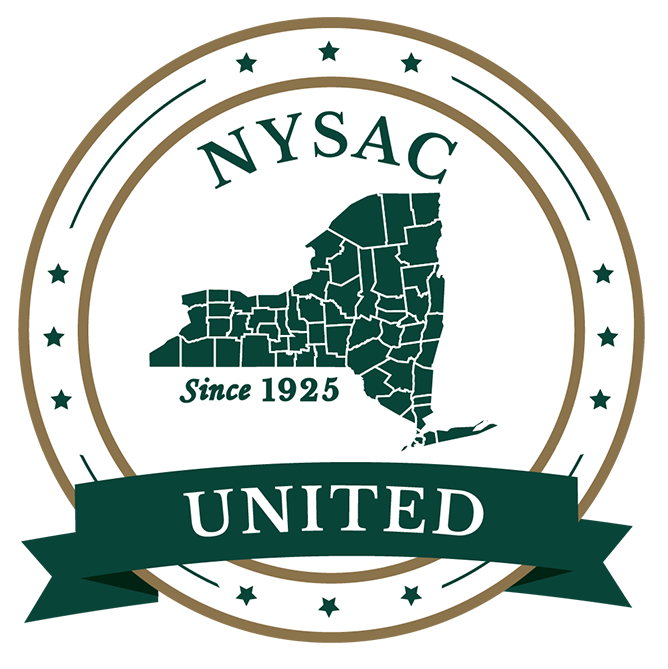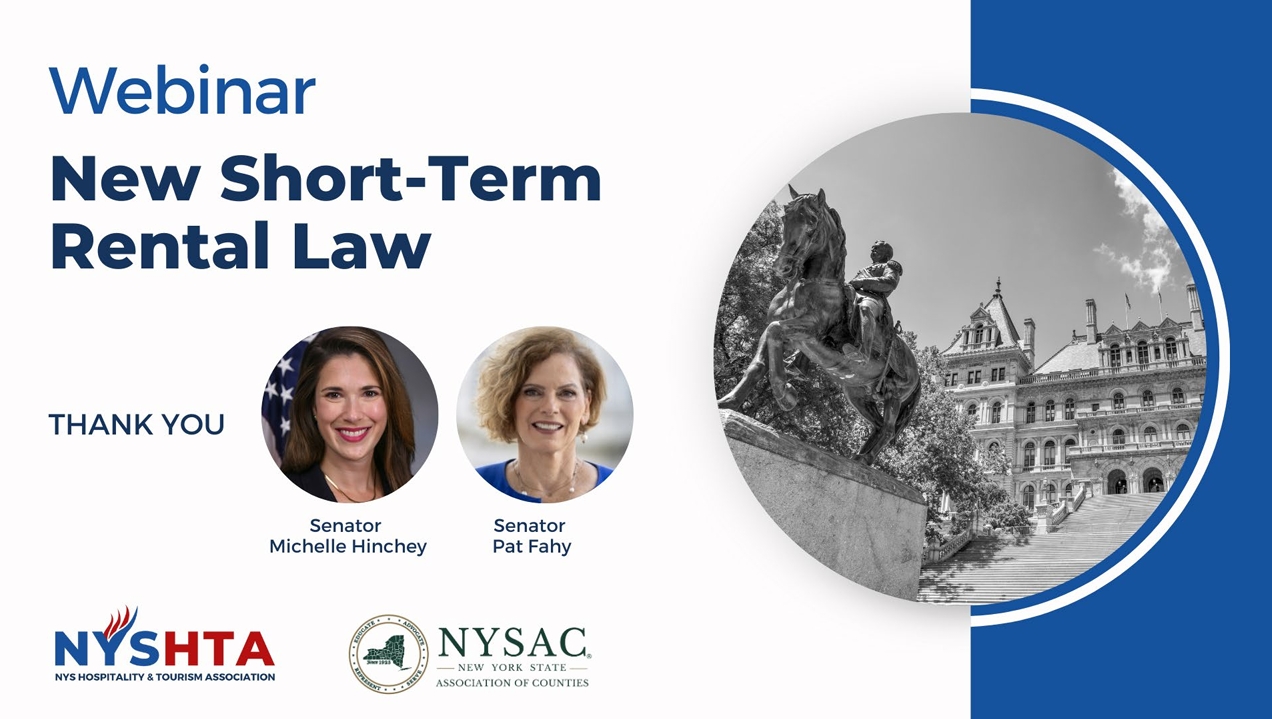The chapter amendment which will pass both chambers and eventually be signed by Governor Hochul is S.820 (Hinchey). An assembly companion bill is forthcoming.
Short-Term Rentals

On December 21st, 2024, Governor Hochul signed into law (pending a chapter amendment) legislation to regulate and govern the short-term rental industry. Sponsored by Senator Michelle Hinchey and Assemblymember Patricia Fahy, the legislation (S.885C / A.4130C) is the first-of-its-kind nationwide.
The law offers a new county-by-county look into the explosive growth of the short-term rental industry and is aimed at helping communities across the state manage housing availability and affordability while bringing in owed revenue from sales taxes and hotel and motel occupancy taxes.
What it Means for Counties
From the county perspective, this legislation will create a system whereby short-term registry platforms will be required to collect and remit to the state tax and finance department both the local sales tax as well as the state’s 4% sales tax. Tax and Finance will then remit those receipts to counties via the normal sales tax distribution process.
Additionally, this legislation authorizes counties (at local discretion) the ability to establish a county-wide short-term rental registry. This registry would also enable counties to receive hotel/motel occupancy taxes from the short-term rental industry. Counties will be required to amend their local laws to allow for the collection of these occupancy tax revenues from STRs. If a county opts out of the registry, they could still enter into voluntary collection agreements or other local mechanisms to collect occupancy taxes from STR vendors.
The registry data collected from the hosts and STR platforms will also provide counties with a glimpse into their current housing stock. A registry would provide counties with address locations, lengths of stay, and the number of guests staying in your community. This may be helpful in understanding the existing housing landscape and how your economic development and planning office can assist local municipalities in land use activity.
Additional Resources
NYSAC Webinar
Alongside New York State Hospitality and Tourism Assocation (NYSTHA), NYSAC hosted a webinar on the new STR law. The webinar covered background, a general overview of the new law, tax collection guidelines and the registration process.
Frequently Asked Questions
Disclaimer: NYSAC staff has attempted to answer these questions to the best of our ability. We encourage all counties to engage and work with your county attorney to ensure proper compliance with state law.
1. What is the bill number for this legislation?
The town will still have the local authority to maintain, regulate, and enforce their local laws or ordinances. This state law does not supersede this authority.
3. Will they be required to see if the STR operators are registered with the county, state etc.?
Yes, the county will receive data from the booking platforms and/or STR hosts and that data will also be shared from the county to the local governments within each county.
Likely yes. For hosts who use a booking platform, the booking platform will collect the occupancy tax from the STR host and they will remit that to the county. For hosts that do not use a booking platform, but manage their listings independently, they will be required to comply with the law, meaning they will be responsible for collecting and remitting the corresponding occupancy tax revenue to the county.
5. What about those that don't use a service? But they do use the internet.
See answer above.
If a host does not register with the county, they will be unable to host their property on a booking platform. The booking platform will be required to verify the registration number with the county.
No. Nothing in this legislation sets forth a particular outline of how the data must be reported.
No. A city or any other unit of local government that has an existing registry prior to the effective date of this legislation, will have the authority to continue to operate and maintain their local registry if they so choose. A local government does have the ability to discontinue their registry and incorporate within the new county registry.
9. Can the counties assess a fee for the registry?
Yes. Per the law, a county may include a fee for the actual and necessary expenses associated with the construction, operation, and maintenance of the county or multi-county registry and for the enforcement of this article.
10. Is the sales tax receipt from NYS going to distinguish this separately from all other sales tax?
Unfortunately, no. The sales tax receipt for short-term rental collections will be part of the regular sales tax receipt a county ordinarily receives.
There is no requirement that the local government merge their data with the county registry.
11a. Our concern is charging STRs multiple fees for multiple registries.
There is the potential for that to occur.
That is correct. Some counties have what is called a voluntary collection agreement with an existing booking platform. This new law allows those relationships to continue should the county and the booking platform wish to continue that arrangement. If a county does not opt out of the registry by local law, then every booking platform providing services in the county and all hosts will be required to register with the county and remit sales tax and occupancy tax accordingly.
13. Sounds like any existing collection agreements will become obsolete, is that the expectation?
That would be a negotiated arrangement between the existing booking platform and the county. These are contractual agreements between two parties, and therefore, may be terminated within the parameters of the contract.
Beginning March 1st, 2025, every host or booking platform will be required to collect and remit sales tax. For bookings beyond March 1, 2025, the host would need to amend their listing to include the collection of that tax.
No, you won’t need to assign a new number unless you choose to do so.
See answers to question 12 and 13.
Where a county has not exercised the option pursuant to paragraph (b) of subdivision one of section four hundred forty-seven-c of article twelve-d of the real property law to enact a local law stating that such county opts not to establish a registration system for short term rental units, as such term is defined in subdivision two of section four hundred forty-seven-a of article twelve-d of the real property law, such county or any local government in such county that is authorized and empowered to impose a tax on hotel and motel occupancy pursuant to this subpart is hereby authorized and empowered to adopt and amend local laws imposing such tax to include a tax on occupancy of a short term rental unit, as such term is defined in paragraph nine of subdivision (c) of section eleven hundred one of this chapter.
No, as long as your local law meets the definition of a short term rental as set forth in the new law. See the definition of a short term rental unit below:
"Short-term [residential] rental unit" means an entire dwelling unit, or a room, group of rooms, other living or sleeping space, or any other space within a dwelling, made available for rent by guests for less than thirty consecutive days, where the unit is offered for tourist or transient use by the short-term rental host of the residential unit, and where such unit is located in a covered jurisdiction.
"Non-covered short-term rental unit" means an entire dwelling unit, or a room, group of rooms, other living or sleeping space, or any other space within a dwelling, made available for rent by guests for less than thirty consecutive days, where the unit is offered for tourist or transient use by a person or entity in lawful possession of the unit, and where such unit is in New York state but is not located in a covered jurisdiction, provided that, however, in a city with a population of one million or more, "non-covered short-term rental unit" shall also include any building or portion of a building that is a short-term rental, as such term is defined in section 26-3101 of chapter thirty-one of title twenty-six of the administrative code of the city of New York.
Yes, if a county doesn’t have an existing occupancy tax in state law, they would need to seek state legislative authority to do so.
We believe that is correct. We would advise the county to amend their state law to allow the county to collect all units.
21. Is the occupancy tax rate still determined at the local level?
No. The occupancy tax rate is determined by the state enabling statute.
The host when completing registration with the county will self-attest to compliance with the new law, i.e. fire extinguishers. However, the county and/or local municipality has the same discretion and authority to inspect the property as they do today to ensure compliance with these standards.
Yes, that is correct.
A "Booking service" means a person or entity who, directly or indirectly:
a) provides one or more online, computer or application-based platforms that individually or collectively can be used to:
(i) list or advertise offers for short-term rentals of short-term rental units, and
(ii) either accept such offers, or reserve or pay for such rentals; and
(b) charges, collects or receives a fee for the use of such a platform or for provision of any service in connection with a short-term rental of a short-term rental unit.
25. How will the general public of hosts be made aware of this legislation?
The booking services will advertise compliance with the new law, i.e. they won’t be able to host their property until they are registered with the county and/or the covered jurisdiction.
26. How do we come up with the registration fee that will be charged to the host? Based on units?
That is a local determination based on the staffing, software, and other costs associated with managing the fee.
No, neither the state nor the STR platforms have the authority to implement a registration fee.
Yes, that is correct.
29. Will you provide an example of the registration application?
There is no registration application outlined in the law. So long as the registry complies with the new law, that is all that is required.
30. If a town does not currently have a STR law, can they still make one?
A town, or any other local government unit is permitted to enact a registry requirement prior to the effective date of this new law. Once the law takes effect, and should the county not opt-out of the registry, the local government will not be allowed to create a new registry. However, a town could implement ordinances and local laws to govern the safety of short-term rental units. They may also still pass a local law or ordinance to ban or prohibit short-tern rental units.
31. Does a DBA registration through our county qualify as a registration?
We would advise consulting with your county attorney.
That is correct. No, the legislation does not go into detail regarding that situation.
That is correct.
Please see the answers to question 30.
Only a link to register.
Yes. Please contact the NYSAC offices at 518-465-1473 should you wish to consult with private sector businesses to maintain and operate your registry.
We would advise you contact the state department of taxation and finance.
Yes, that is correct.
The law does not specify that authority. We would advise consulting with your county attorney.
Any local government, including a county environmental health department still would have the same authority to inspect for health and safety of their residents and visitors.
41. Do counties need a local law to create a registry, or can this be done by resolution?
The county will not be required to file any local law to create a registry.
42. We are a county without an occupancy, can you reiterate what needs to be done?
Yes, should you wish to collect occupancy tax on short-term rental units, the county would need to seek state legislative authority to create a local occupancy tax. Should the county not wish to pursue an occupancy tax, the county can either choose to participate in the registry or they can pass a local law opting out of the registry. Either way, the county would receive the local share of the sales tax collected on short term rental units.
Contact Us
New York State Association of Counties
515 Broadway, Suite 402
Albany, NY 12207
Phone: (518) 465-1473
Fax: (518) 465-0506





